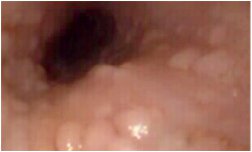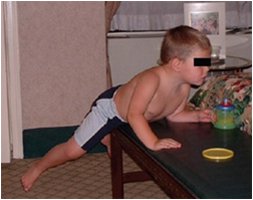The Association between Autism and Gastrointestinal Illness:
Our Gratitude to Andrew Wakefield, M.D.
Our Gratitude to Andrew Wakefield, M.D.
Dear KGW and KATU and CNN,
Please read the following medical history of how autism is connected to bowel disorders. Read and weep.
The Association between Autism and Gastrointestinal Illness: Our Gratitude to Andrew Wakefield, M.D.
Thursday, January 28, 2010 at 9:28am
1943: In his seminal paper describing autism, Leo Kanner reported that six of his first 11 autistic patients had “feeding or dietary issues.”
1951: researchers D.G. Prugh, Padget Danes and C. Hans Asperger, in separate reports described abnormal, autistic-like behaviors in children with gluten sensitivities.
1961: William Crook found that profound neurological behaviors, including autism and schizophrenia, resolved with elimination of certain foods in selected patients.
1966: F.C. Dohan correlated increased cereal and processed grains since World War II with an increased incidence of schizophrenia and autism.
1971: Barry Goodwin reported that seven of the 15 autistic children he had randomly selected from a local community for his study had chronic diarrhea. He found that placing these children on a gluten-free diet improved GI symptoms, as well as abnormal EEG findings.
1990 & 1991: Shattock and Reichelt (respectively) reported that peptides from milk and gluten were found in the urine of people with schizophrenia and autism. They speculated that these products might have contributed to the cause of these conditions.
1995: Lucarelli reported that 36 percent of children with autism who were undergoing endoscopy for GI symptoms had allergies.
1999: Horvath found a high incidence of lactose and sugar intolerance among his autistic research subjects.
2002: Horvath also reported that up to 50 percent of the families he surveyed indicated that their autistic children had food allergies or sensitivities.
2005 Buie, Kushak, Winter and Farber showed that 59 percent of autistic children who were undergoing endoscopy for GI symptoms had carbohydrate digestive abnormalities, compared with only 11 percent in unaffected children undergoing endoscopy for GI symptoms. In this study, duodenal (beginning of small intestine) biopsies were taken from 307 autistic children and 206 non-autistic children selected for endoscopy based on a suspicion of GI problems. Results of the study showed that the frequency of lactase deficiency was higher in autistic children over five years of age than unaffected children, but the frequency was quite high even in the unaffected children with GI symptoms
The MMR Controversy
1998: Andrew Wakefield identified lymphoid nodular hyperplasia in the distal ileum (part of the bowel) in seven out of 12 patients with autism, and found that 11 of the 12 patients had frank colitis (a form of inflammatory bowel disease).
2000: Wakefield published a study describing “autistic enterocolitis” as a unique intestinal lesion with prominent lymphoid nodular hyperplasia and colitis. He proposed the MMR vaccine as the cause of the GI pathology. He also hypothesized that increased GI permeability allowed opioid peptides to cause neurological dysfunction or encephalopathic type issues.
Epidemiology studies (involving non-autistic children) have disputed a link between MMR and autism, but to date, there have not been independent endoscopic studies evaluating findings and presence of measles virus in the tissue.
Tim Buie, MD; MGH:
Warning Signs - if seen in a patient, warrant a GI evaluation. Some of these signs include:
1) chronic diarrhea or constipation
2) feeding/eating disorders
3) change in sleep patterns
4) food allergies or apparent changes with particular food exposure
5) behavior changes, especially self-injurious, aggressive or mouthing behaviors

“Here's a little boy I've been seeing in England. Here he is on the left at the age of one, perfectly happy and healthy, and on the right at the age of six. He looks like a child from a famine zone in East Africa. He has no muscle mass at all, he has a hugely distended abdomen--this child has an underlying gastrointestinal disease until proven otherwise. And yet pediatric gastroenterologists to whom this child was referred would not see him on the basis that his condition was too controversial. There is nothing controversial about this child. The person who is under investigation in this family is not the child, but the mother, for starving her child. He has two brothers and a sister (behind him in this picture), and they belie that contention because they are perfectly well-nourished. This is the awkward position in which medicine has placed itself-practitioners fail to treat children because of the prevailing dogma, choosing to blame the parents for the disease instead.”
-Andrew Wakefield, M.D.
 This photo, “showing nodular esophagitis, was taken in an autistic 38-year-old man. He had endured more than thirty years of ongoing GI symptoms before he was finally scoped and biopsied. This was the worst I have ever seen-his symptoms were very, very intense and he had tremendous pain. Did he remain autistic after we started treating him? Yes, absolutely, he was very low functioning, but his pain disappeared. He could not talk and he could not look you in the eye, but he could e-mail, and he was very insightful and intelligent. He knew about politics and he commented on everything—a very interesting man. Treatment changed his life, because when he had pain, his OCD would make him take off all his clothes, regardless of where he was. Since he was an adult, people frequently got scared, and called the police. Essentially he became a shut-in. Since he was very intelligent and liked to be out in the world, getting rid of his pain and the resulting behavior made major improvement in his quality of life possible.”
This photo, “showing nodular esophagitis, was taken in an autistic 38-year-old man. He had endured more than thirty years of ongoing GI symptoms before he was finally scoped and biopsied. This was the worst I have ever seen-his symptoms were very, very intense and he had tremendous pain. Did he remain autistic after we started treating him? Yes, absolutely, he was very low functioning, but his pain disappeared. He could not talk and he could not look you in the eye, but he could e-mail, and he was very insightful and intelligent. He knew about politics and he commented on everything—a very interesting man. Treatment changed his life, because when he had pain, his OCD would make him take off all his clothes, regardless of where he was. Since he was an adult, people frequently got scared, and called the police. Essentially he became a shut-in. Since he was very intelligent and liked to be out in the world, getting rid of his pain and the resulting behavior made major improvement in his quality of life possible.”
-Dr. Krigsman, Thoughtful House
Dr. Andrew Wakefield:
If it (LNH) were causally associated with measles virus, then what would we expect? We would expect there to be a historical association between measles exposure and developmental disorders. In 1956, at the Section of General Practice in the Royal Society of Medicine, Dr. Daynes stated: Typically a child between one and five years becomes naughty and difficult a few days after the onset of an acute infectious illness... such as measles or gastroenteritis... he's irritable, negativistic and spiteful, sleep is disturbed and he wakes up in the night and often screams: his appetite is poor, he fails to gain weight, his abdomen is often distended and the stools may become bulky, pale, and offensive.
Does that sound familiar?
Dr. Daynes continued," The study of over forty cases has led me to formulate a syndrome, pre-celiac syndrome.. This condition, if left untreated, usually rights itself after a month or two, but it may last for much longer in which case slight petit mal attacks may develop in addition to worsening of the other symptoms... I have been placing these children on a gluten-free diet at the earliest opportunity and the symptoms respond dramatically, usually within two or three days. They relapse if a premature return to a normal diet is made."
 This is a photo of a child posturing. This child spent an inordinate amount of time leaning over tables and armrests.
Dr. Krigsman: “We found colitis and other GI pathology in this child, and when he was treated, his stools and his pain normalized and this posturing activity disappeared completely. After that I began paying attention to posturing, and I found that many of these children do it, in all sorts of creative ways. We invariably find disease on endoscopy, and when we treat it properly, the posturing always disappears- it is not a "stim." When a child does this, even if there are no other overt symptoms, I assume it is abdominal pain until proven otherwise.”
On the right “is a picture of a self-injurious child who has damaged himself in an attempt to escape extraordinary abdominal pain--pain that he had lost the ability
to communicate. [No Photo available] His mother instinctively knew he was suffering, yet could not convince anyone in the medical profession to respond appropriately.
This is a photo of a child posturing. This child spent an inordinate amount of time leaning over tables and armrests.
Dr. Krigsman: “We found colitis and other GI pathology in this child, and when he was treated, his stools and his pain normalized and this posturing activity disappeared completely. After that I began paying attention to posturing, and I found that many of these children do it, in all sorts of creative ways. We invariably find disease on endoscopy, and when we treat it properly, the posturing always disappears- it is not a "stim." When a child does this, even if there are no other overt symptoms, I assume it is abdominal pain until proven otherwise.”
On the right “is a picture of a self-injurious child who has damaged himself in an attempt to escape extraordinary abdominal pain--pain that he had lost the ability
to communicate. [No Photo available] His mother instinctively knew he was suffering, yet could not convince anyone in the medical profession to respond appropriately.Because his mother treated his underlying gastrointestinal disease appropriately and diligently (by a special exclusion diet) we now have the Superman that you see on the left.” [No Photo available]
-Dr. Andrew Wakefield
 So I appeal to the conscience of this great country: unless we take this sufficiently seriously, unless we address this issue now, unless we prevent the subversion of the scientific process in favor of political and financial expedients, then we are in terrible trouble. Vaccination policy is nothing more than words on paper without public confidence. If we undermine confidence in the vaccination program by sticking our heads in the sand, then we have done children everywhere a huge disservice.
Autism is a national economic and spiritual emergency, one that will tear the very fabric of society if we let it. It is a world emergency, and we need to start treating it as such. I leave you with the words of Ronald Reagan, who said "..government is never more dangerous than when our desire to have it help us blinds us to its power to harm us." In this instance, I, for one, take that to heart.
So I appeal to the conscience of this great country: unless we take this sufficiently seriously, unless we address this issue now, unless we prevent the subversion of the scientific process in favor of political and financial expedients, then we are in terrible trouble. Vaccination policy is nothing more than words on paper without public confidence. If we undermine confidence in the vaccination program by sticking our heads in the sand, then we have done children everywhere a huge disservice.
Autism is a national economic and spiritual emergency, one that will tear the very fabric of society if we let it. It is a world emergency, and we need to start treating it as such. I leave you with the words of Ronald Reagan, who said "..government is never more dangerous than when our desire to have it help us blinds us to its power to harm us." In this instance, I, for one, take that to heart.
- Andrew Wakefield, M.D.
PLEASE SHOW TO YOUR NEWSROOM and tell yourselves this giant question? Is it fair to report the news you got on AP WIRES, when you didn't read the science first? Is it fair to my children, and others, to go on vaccinating children, when we don't know what the mechanisms of having a live measles virus from vaccine in their tummies circulating throughout their entire central nervous system? Is it right to have circulating antibodies against myelin sheath in the brain by a measles virus?
I think the news outlets, need to do some hardcore background before the mouth off, that vaccines don't cause autism. Just recently, KGWPortland had an indepth report of texting on college campuses, and how this was increasing sexual violence. They took over fifteen minutes to do such a report. Yet, when I contacted KGW, they voiced, they "couldn't take the time" to tell this story? Do we have our priorities right? Or are we too beholden to the pharmaceutical Gods, to make sure we aren't doing something horribly wrong to these children, and as Kim S said on CNN, closing the door on the science? Shame on the news organizations who are now acting as Gods, and Henchmen to millions of children, and mothers who now will not doubt nor question the vaccine program, SHAME, SHAME, SHAME...
Kathy Blanco
Beaverton, Oregon
“An observant parent’s evidence may be disproved but should never be ignored” —Lancet 1:688, 1951, Anonymous